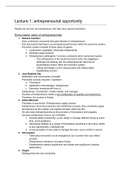Lecture 1; entrepreneurial opportunity
People are not born as entrepreneurs. But they have special characters.
Some classic views on entrepreneurship
1. Richard Cantillon
Early contributor/ economist that paid attention to entrepreneurs
- First discovered that there is an entrepreneurial function within the economic system.
- Economic system consists of three types of agents:
1. Landowners (capitalists, financially independent)
2. Hirelings (wage workers)
3. Entrepreneurs (arbitagers)> Involves uncertainty which cannot be insured
- The entrepreneur is the central economic actor. By engaging in
arbitrage and bearing risk, the entrepreneurial class has an
equilibrating function within the economic system.
- Taking advantage in price: Buying lower and selling higher
- Equilibrating function
2. Jean-Baptiste Say
Distribution and consumption of wealth.
Production process requires 3 operation:
a. Theoretical
b. Application of knowledge> entrepreneur
c. Execution (making profit from it).
Entrepreneur: Coordinator, modern leader, and manager
- Success of entrepreneurs needs a rare combination of qualities and experience.
Therefore, the number is limited
3. Alfred Marshall
Principles of economics. Entrepreneurs supply product
- Entrepreneurs drive the production and distribution process, they coordinate supply
and demand on the market, and capital and labor within the firm.
- He also sees entrepreneurship as the provision of innovations and progress.
Success entrepreneur have a set of abilities:
1. General ability (trustworthy, to act, ability to manage different things at same
time, avoid problems)
2. Specialized abilities (e.g. power of forecasting something in the future, ability
to see opportunities, undertake risk
3. A natural leader of men (able to manage the team, solve conflict in teams)
4. Schumpeter
- Talks about innovation as an endogenous (so it comes from your effort)
process.
- Entrepreneurs introduce innovative things.
- Entrepreneurs destroy equilibrium and create new equilibrium (creative
destruction).
5. Knight
Distinguished risk and uncertainty
, - The essence of the entrepreneur’s position is his responsibility for direction
and control whenever uncertainty is involved
- Entrepreneurial ability: high degree of self-confidence, power to judge
personal qualities as compared to those of other individuals, act on one’s own
opinion, foresight, leadership, intellectual capacity
6. Kirzner
- Entrepreneurship requires a special type of knowledge: knowing where to
look for knowledge > alertness
- Entrepreneurs are alert to discover and exploit profit opportunities.
Alertness to better match between supply and demand.
What makes someone an entrepreneur?
- Ability to observe and act to opportunity
- Risk taker
- Creativity
Defining entrepreneur
Individual differences
- Greater self-efficacy (do you believe you have the skills/ability/knowledge to act-
About confidence as well)
- More internal locus of control (making decisions)
- Greater tolerance for ambiguity (dealing with uncertainty)
- Higher need for achievement
But also
- Difference in perception (e.g. perception in taking risk, how much you are able to
take risk )
- Difference in optimism (personality, able to implement opportunity successfully,
expectation, financial aspect is important)
- Weighting the expected value (of combination of resources) over the cost
- Consideration concerning costs
- Social ties with resource providers
- Prior knowledge
, Shane & Venkatarman (2000)
How and why are opportunities discovered?
- All types of environments will let you see some opportunities.
First technique:
- Whether it is technological, political, regulatory,and demographic changes,
new/ different information, economies in constant disequilibrium
Second:
- Information not known to all parties at all times: asymmetries of information
and beliefs across time and space.
- Information corridors(), cognitive properties (means end relations,
ability to see relationships, e.g. you can see that … effects ...)
- e.g. if you have a specific knowledge that others don’t have, it can
help you to create something new
- Different assumptions about the accuracy of resource value: Misallocation
(shortages( : How much are we able to make accurate decision based on
accurate information) / surpluses)
- Exploitation of market inefficiencies: New means - ends relationships
Academic challenge: Can Spotting opportunities be taught? If yes> What should be taught?
Yes, we can. But it requires time and you have to change some habits.
- Focus on behavior, not on characteristics (hard to change)
Techniques that can be taught:
- mindmapping
- Challenging assumption
- Misconceptions around how successful products get built: Most innovative products
built on several Incremental innovations (and failure)
- People built their ideas sometimes based on other ideas
- Increased emphasis on context and entrepreneurial process: Startup is something
different than case study process
Alvarez & Barney (2007) Opportunity discovery vs creation
Discovery: There is an opportunity out there, waiting to be discovered.
Creation: Actively generating new ideas.





